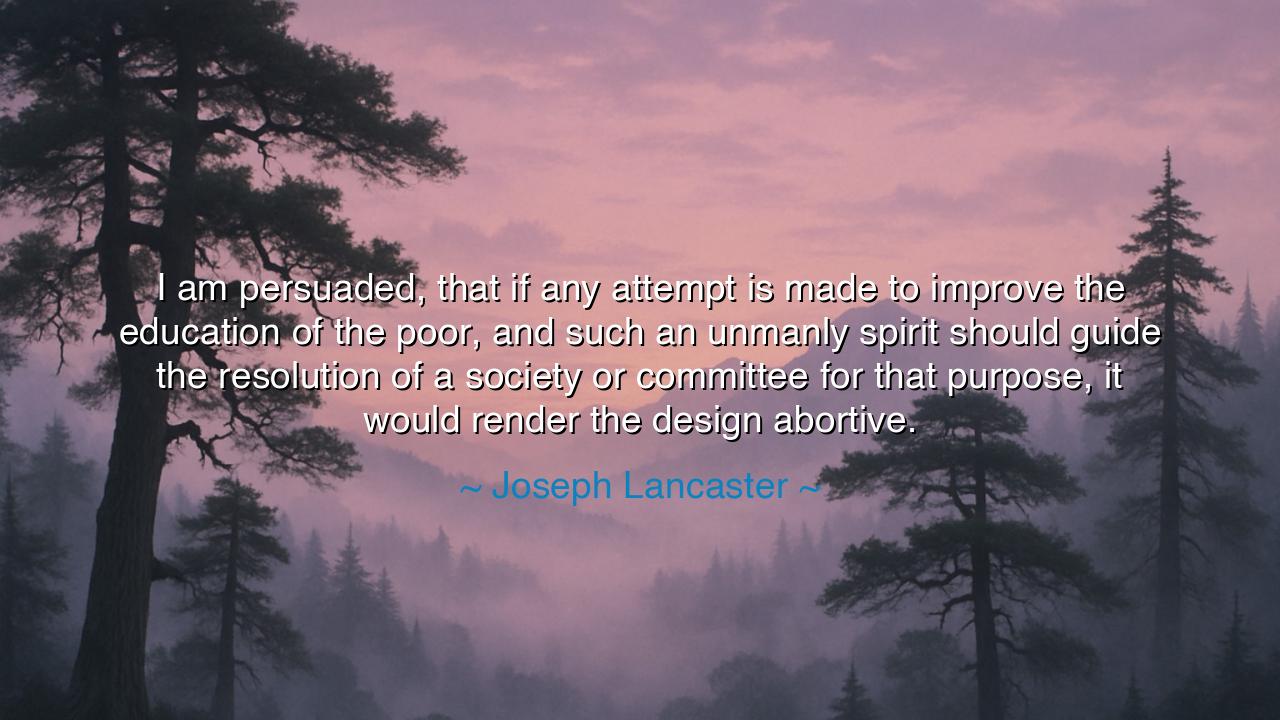
I am persuaded, that if any attempt is made to improve the
I am persuaded, that if any attempt is made to improve the education of the poor, and such an unmanly spirit should guide the resolution of a society or committee for that purpose, it would render the design abortive.






“I am persuaded, that if any attempt is made to improve the education of the poor, and such an unmanly spirit should guide the resolution of a society or committee for that purpose, it would render the design abortive,” wrote Joseph Lancaster, a man who dared to dream that knowledge could be the inheritance of all—not merely the privilege of the rich. His words were penned in an age when education was a treasure locked behind class and coin, and ignorance was not a failure of mind but a sentence imposed by circumstance. In this solemn warning, Lancaster spoke not only to his contemporaries, but to every generation that would ever seek to lift the lowly through learning. He reminds us that the success of education depends not on policy or funding alone, but on the courage, integrity, and spirit of those who guide it.
Lancaster was a reformer of the early nineteenth century, a pioneer who sought to bring education to the children of the poor in England through his revolutionary “monitorial system.” In this method, older or more advanced students helped teach the younger ones, multiplying the reach of a single instructor. His dream was nothing less than the democratization of knowledge. Yet even as he labored to teach thousands who had been forgotten by society, he saw that the greatest enemy of his cause was not poverty itself, but cowardice—that “unmanly spirit” which fears discomfort, controversy, or sacrifice. For what is education without bravery? What is reform without conviction? Lancaster understood that to educate the poor was to challenge the very foundations of inequality—and that such a mission demanded hearts of steel.
The “unmanly spirit” he condemned was the spirit of timidity—the refusal to face opposition for the sake of righteousness. It was the voice that whispered, “Do not disturb the order; do not risk your comfort for the good of others.” To Lancaster, such weakness in leadership would “render the design abortive,” meaning it would kill the dream before it was born. For every noble effort requires not only wisdom, but courage—the courage to defy tradition, to resist the scorn of the powerful, and to endure the trials that accompany every act of compassion. The coward, though clothed in fine reason, builds nothing that lasts. The brave, though opposed by the world, plants seeds that outlive him.
Consider how this truth has echoed through history. When Socrates taught the youth of Athens to question and to think, he was condemned by those who feared the enlightenment of the common man. When Ignatius of Loyola and the Jesuits founded schools across the world to educate the poor and the powerless, they were denounced and driven into exile. Yet the works of such men endured precisely because they refused to be guided by an unmanly spirit. They faced opposition with fortitude, and their designs flourished where timidity would have failed. The lesson is eternal: education, like faith and freedom, survives only when defended by the brave.
Lancaster’s words are also a mirror held up to the soul of every age. In our time, as in his, many speak of improving education, of equality, of reform. Yet how often do such words fade when confronted with inconvenience or criticism? How often do committees choose comfort over conscience, popularity over progress? Lancaster would call this the disease of faint hearts—the corruption of noble aims by the fear of cost. He would remind us that education is not merely an act of policy, but of moral courage—the willingness to confront ignorance, to challenge apathy, and to bear the burden of transforming society itself.
And beneath his words lies another, gentler truth: that education is not charity, but justice. To educate the poor is not to bestow kindness, but to restore balance—to give back what has been unjustly withheld. For knowledge belongs to all who are born into the light of reason; it is the birthright of every soul. Thus, when Lancaster speaks of the “design” of educating the poor, he speaks not merely of schools and systems, but of the design of civilization itself. Without education, the poor remain bound by ignorance; with it, they rise into dignity, creativity, and power. Yet this sacred design, he warns, is fragile—it can be undone by cowardice in the hearts of those entrusted to carry it forward.
Therefore, let this teaching be passed down as a law of the spirit: whenever you strive to uplift others—through knowledge, through compassion, through justice—do so with courage, or do not do it at all. For the faint-hearted cannot build what the brave envision. Let those who lead remember that no good design endures unless it is sustained by strength of character and purity of intent. To educate, to reform, to create—all these are acts of valor as much as intellect.
And so, as Joseph Lancaster teaches across the centuries: the improvement of humanity begins not in policy, but in spirit. When courage fails, education falters; when conviction weakens, progress dies. But when we meet ignorance with bravery and fear with steadfastness, then the seeds we plant today will become the forests of tomorrow. Let every teacher, leader, and dreamer remember this: the light of knowledge burns only as brightly as the courage of those who carry it.






AAdministratorAdministrator
Welcome, honored guests. Please leave a comment, we will respond soon